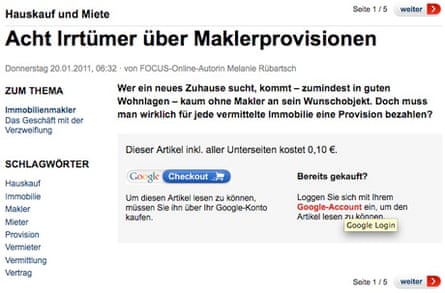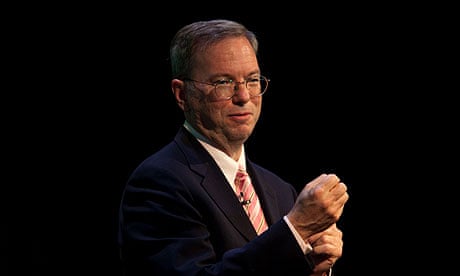The media hubbub around the launch of Apple and Google's respective toll-booths for news last week has yet to die down. But over in Munich, one of Google's launch partners has been quietly transforming its online news model.
Focus Online, Germany's third most-read news site behind Bild and Spiegel Online, now charges a modest 10 cents (8p) an article, with "five or six" features a day going through Google's checkout.
"It really is just a test at this stage," said Armin Blohmann, the head of communications and investor relations at parent company Tomorrow Focus. "We don't know yet whether it will be successful – it's just a small test – but we'll give it a couple of months and then make a decision on whether to go on with One Pass or not."

At eight pence a pop, Google's not making anyone rich in Munich. But that's not the plan, says Blohmann:
We believe it could be a success but don't know yet. We don't expect it make much money in the beginning. But if articles are relevant in the longer term then it could be a good way to earn money – I'd say 500 euros (£421) each year [5000 articles a year, or 14 articles a day] is okay for four or five years. This isn't about transforming our business, the majority of our income will be advertising for a long time to come, but it is about testing what else could work.
Google will keep one cent for each article Focus Online sells. Is that a fair portion? "10% sounds about fair," he says. "If Google is remaining with that model I would say yes, that's fair."
Interesting, though, that Google apparently hasn't committed to sticking with 10%, given Apple's uncomfortable silence about its "greedy" 30% grab. James McQuivey, a digital media analyst at Forrester, told me last week that publishers were "worried" that 10% was "just an early discount" from Google.
Eric Schmidt's soothsaying that Google's "intention is for publishers to make all the money" and "we basically don't make any money off this" seemingly doing little to quell the media's inherent wariness.
Back to Focus Online. For what exactly, 10 cents? Something called "utility journalism," says Blohmann, also known as "news you can use". Some examples:
Eight misconceptions about real estate brokers' commission
Ten facts about parental leave
Traffic crimes and their consequences – what to do if you lose your drivers' license
Traffic offenders – your rights
Traffic offenders – problems and rights in foreign countries
Blohmann explains: "It won't work if it's about Egypt right now or football results – people will just get them somewhere else. But if the articles are relevant in the longer term then that could work".
It would be interesting to test that model in a market where an eHow, or an equivalent so-called "content farm", is staking its claim.
For now, One Pass is a platform for the most modest of experiments. Its significance could be understated in this light, but it is more than noteworthy in the wider arena of what terms the holy trinity of publishers, customers and technology companies are happy with.
A tenth of revenue may be a high price to pay this time next year, when platforms have evolved from today's oligopoly – and publisher unease around the battling giants has eased.

Comments (…)
Sign in or create your Guardian account to join the discussion